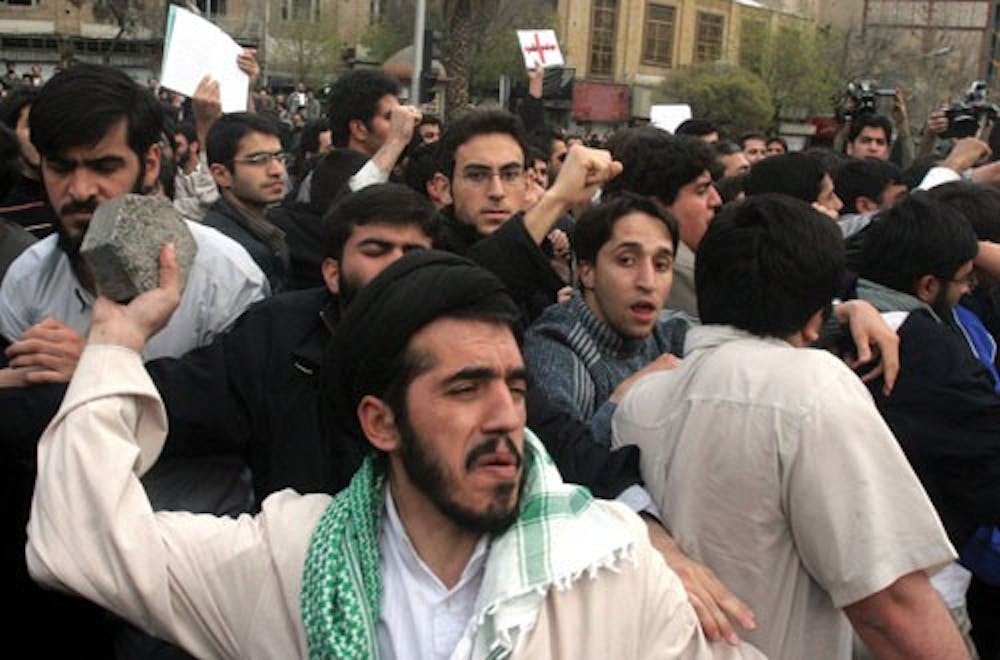TEHRAN, Iran – About 200 Iranian youths threw rocks and firecrackers at the British Embassy on Sunday, as the British government said it was in direct contact with Iran over the capture of 15 British sailors and marines.\nDefense Secretary Des Browne said Britain was in “direct, bilateral communication with the Iranians.” A Ministry of Defense spokeswoman said Browne was referring to letters and other contacts between diplomats, rather than any new face-to-face talks.\nBrowne, on a visit to Afghanistan, said Britain had “the support of almost the whole international community” in calling for the release of its personnel, who were seized by Iran 10 days ago.\nBritain maintains they were in Iraqi waters when detained, but Iran has contended the Britons entered its waters illegally.\nIn Iran, hardliners called for their government to remain firm.\nAt Sunday’s protest, several dozen policemen prevented the protesters from entering the embassy compound, although a few briefly scaled a fence outside the compound’s walls before being pushed back, according to an Associated Press reporter at the scene.\nThe protesters chanted “Death to Britain” and “Death to America” as they hurled stones into the courtyard of the embassy. They also demanded that the Iranian government expel the British ambassador and close down the embassy, calling it a “den of spies.”\nBritain’s Foreign Office said there had been no damage to the compound.\nA British Foreign Office spokeswoman in London, speaking on condition of anonymity in line with government rules, said diplomats were working normally inside the embassy.\n“There is a police presence outside and there is no risk to those inside,” said the spokeswoman.\nBritish government and defense officials refused to discuss a report that claimed a Royal Navy captain or commodore would be sent to Tehran as a special envoy to negotiate the return of the personnel.\nThe official would deliver an assurance that British naval crews would never deliberately enter Iranian waters without permission, the Sunday Telegraph newspaper reported.\nTransport Minister Douglas Alexander said Britain was engaged in “exploring the potential for dialogue with the Iranians.”\n“The responsible way forward is to continue the often unglamorous, but important and quiet diplomatic work to get our personnel home,” Alexander told the British Broadcasting Corp.’s Sunday AM program.\nBritish Foreign Secretary Margaret Beckett appeared to soften rhetoric against Iran Saturday – though she stopped far short of the apology sought by many in Iran.\n“I think everyone regrets that this position has arisen,” Beckett said in Bremen, Germany, before returning to England. “What we want is a way out of it.”\nPresident Bush on Saturday called for the release of the sailors and marines and labeling their capture “inexcusable behavior.”\n“Iran must give back the hostages,” Bush said. “They’re innocent, they did nothing wrong, and they were summarily plucked out of waters.”\nEight British sailors and seven marines were detained by Iranian naval units March 23 while patrolling for smugglers near the mouth of the Shatt al-Arab, a waterway that has long been a disputed dividing line between Iraq and Iran.\nIranian President Mahmoud Ahmadinejad called world powers “arrogant” for refusing to apologize.\n“Instead of apologizing over trespassing by British forces, the world arrogant powers issue statements and deliver speeches,” Iran’s official IRNA news agency quoted Ahmadinejad as saying during a speech in the southeastern city of Andimeshk.\n--Associated Press writers Jill Lawless and David Stringer in London, and Deb Riechmann in Camp David, Md., contributed to this report.
Iranians protest outside British Embassy over captures

Get stories like this in your inbox
Subscribe


